FEATURE ARTICLE -
Issue 30 Articles, Issue 30: Oct 2008
Cross-examination can be likened to firing bullets. Ideally they hit the target. But sometimes they miss their mark, ricochet and injure the person who fired them.
Who makes the bullets? Often it is the cross-examiner, who gets inspiration at 1 am from some previously unread document. The 10 am killer question is formulated nine hours earlier under the influence of caffeine. Sometimes the bullet is made by others, and the cross-examiner simply fires it.
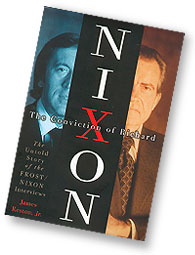
The Conviction of Richard Nixon is a book by someone who made the bullets for someone else to fire: the ammunition that finished off Richard Nixon.
The scene is not a courtroom. The cross-examiner is not a lawyer, but David Frost, a television personality and celebrity interviewer. The year is 1977, three years after President Nixon resigns in disgrace in the face of impeachment over the Watergate scandal. Frost pays Nixon $1million to participate in interviews that are to be taped over twelve days.
At the time James Reston Jr was a young academic, who was asked to join Frost’s research team. His job was to supply research for the crucial interviews about Watergate and, in two months, he combed through the 47 volumes of House Impeachment Committee evidence and 120,000 pages from the Watergate cover-up trial. In addition, he accessed previously sealed evidence of transcripts recording Nixon’s part in the Watergate cover-up.
A recent history of the Nixon Presidency by Rick Perlstein, Nixonland: The Rise of a President and the Fracturing of America, captures Nixon’s mendacious character in advice that Nixon gave to a colleague: “You’ll never make it in politics, Len. You just don’t know how to lie”.
Nixon was no fool: his skill and cunning had got him to the top of politics. James Reston Jr thought of him as similar to Proteus, the mythological Greek God of the sea who possesses all of the skills and tricks to not be snared. Reston and others were sceptical of Frost’s ability to extract a confession from Nixon. Many thought Frost was not up to job or that the interviews were a fix. Nixon, a crafty trial lawyer by training, saw the interviews as his chance to rehabilitate himself publicly and re-enter public life. Early indications were that Frost was no match for Nixon. Nixon escaped any hard questioning over foreign affairs and the war in Vietnam and Cambodia.
Reston’s book is a memoir of being inside the Frost team, as approaches to the interviews and possible questions are canvassed, and as Nixon asserts his dominance in the first 14 hours of interviews. It also describes Nixon’s awkwardness in social settings when the TV cameras were not rolling. After a weekend break from interviews, Nixon chats with Frost in the kitchen about their respective weekend activities and asks Frost “Did you fornicate?”, to which the amiable Frost is left literally speechless.
 Nixon is a psychoanalyst’s goldmine: an ambitious student from a poor Quaker upbringing. His family’s poverty meant he declined a scholarship to Harvard. He is a football fanatic who quotes his College football coach saying “Show me a good loser, and I’ll show you a loser”. He claims to follow the Quaker concept of “Peace at the Center”, meaning that he is able to retain peace within, while storms and adversity circle him. Yet he is moved by dark forces. Reston hints at something weird in Nixon’s relationship with some associates with whom he would hang out in Florida during his Presidency.
Nixon is a psychoanalyst’s goldmine: an ambitious student from a poor Quaker upbringing. His family’s poverty meant he declined a scholarship to Harvard. He is a football fanatic who quotes his College football coach saying “Show me a good loser, and I’ll show you a loser”. He claims to follow the Quaker concept of “Peace at the Center”, meaning that he is able to retain peace within, while storms and adversity circle him. Yet he is moved by dark forces. Reston hints at something weird in Nixon’s relationship with some associates with whom he would hang out in Florida during his Presidency.
For all of his contradictions and psychological foibles, Nixon was a formidable opponent and there was every indication that Frost would not engage in tough questioning. Still, on occasions, Frost gives Nixon enough rope to hang himself. In an early interview, Nixon brazenly states: “If the President did it, that means it’s not illegal”.
Reston recently reflected in an interview: “I think the fact [Frost] began as a comic, he had a sense of the theatrical. He understood that sometimes soft questions can elicit very interesting material.”
Back in 1977 and before the Watergate interview, Reston’s fears that the historic opportunity to gain a public confession of guilt from Nixon over the Watergate scandal will be lost and that Frost’s epitaph will be “He paid $1m for Nixon’s resurrection”. There is a week before the Watergate interviews and the question is whether Frost is up to it.
After a splendid birthday party, Frost bunkers down, and works 18 hour days for the next six days. The ambush is set. Frost dismantles Nixon’s defences in a mix of general and fact-laden questions. At one point Nixon seeks to deflect the line of questions on his role in the Watergate cover-up by asking Frost whether he was saying that Nixon was part of the cover-up. Reston observes:
“It was a crucial moment, a moment that took considerable courage for David Frost.
“Yes”, he said stoutly.
“After July 6, when I talked to Gray?” Nixon queried.
Frost solidified his position. “I would have said that you joined a conspiracy which you thereafter never left.”
“Then we totally disagree on that.”
No journalist in America, I concluded, would have had the courage of Frost in that vital moment. But therein lay the failing of American journalism. For Frost here was an advocate. He was far beyond the narrow American definition of “objective journalism”.”
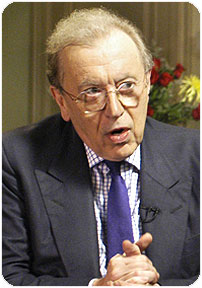 Frost assumes ascendancy when he shows that he is familiar with the elements of the offence of endeavouring to pervert the course of justice. Nixon is not. Frost is on top of his brief. Initially, he cannot extract a confession from Nixon of being part of a cover-up. But Nixon is on the ropes.
Frost assumes ascendancy when he shows that he is familiar with the elements of the offence of endeavouring to pervert the course of justice. Nixon is not. Frost is on top of his brief. Initially, he cannot extract a confession from Nixon of being part of a cover-up. But Nixon is on the ropes.
Rather than go in for the kill, Frost unexpectedly calls for a break, and Nixon and his staffers take the opportunity to regroup. When the interview resumes, Frost the showman throws away his clipboard and asks:
“Would you do what the American people yearn to hear — not because they yearn to hear it, but just to tell all — to level? You’ve explained how you got caught up in this thing. You’ve explained your motives. I don’t want to quibble about any of that. Coming down to sheer substance, would you go further?”
Nixon, gesturing with the blade of his hand asks Frost:
“Well, what would you express?”
It’s one of those awkward moments, like when a witness asks a barrister a question, and the reflex response is to say, “I’m asking the questions around here”. Instead, Frost rises to the task. Reston comments:
“Every American journalist I have ever known would shrivel at this plea for help, hiding with terror behind the pose of the uninvolved, “objective” interviewer. The question was worthy of Socrates: Frost must lead Nixon to truth and enlightenment. He took up the challenge, haltingly, even articulately at first.”
Frost locks onto three categories:
“One, there were more than mistakes. There was wrongdoing, whether it was a crime or not. Yes, it may have been a crime, too. Two, the power of the presidency was abused. The oath of office was not fulfilled. And, three, the American people were put through two years of agony, and … I apologize. I know how difficult it is for anyone, and most of all you, and I think the American people need to hear it. I think that unless you say it, you’re going to be haunted for the rest of your life. …”
An apology of sorts follows. Eventually, Nixon expresses regret for his misleading statements about the scandal.
Stunningly, Frost offers an escape by asking whether Nixon means that he was caught up in the cover-up activities of others. Oddly, Nixon declines the gift.
“I don’t go with the idea that what brought me down was a coup, a conspiracy. I brought myself down. I gave ’em the sword. They stuck it in and twisted it with relish. I guess if I’d been in their position, I’d’a done the same thing.”
He acknowledges that any reasonable person would call it a cover up. He continues:
“I let down my friends. I let down our system of government, and the dreams of all those young people that ought to get into government, but now think it too corrupt.”
Finally, Frost, the entertainer, has brought Nixon and the American nation to an epiphany. Nixon acknowledges that by resigning he impeached himself.
Nixon’s confession, watched by 45 million viewers, denies him the chance of public rehabilitation.
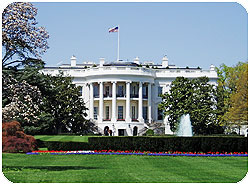 Thirty years later, a battle has opened between Reston and Frost over bragging rights for the Watergate interview. Reston’s book is a claim for the credit in providing Frost with the material. Reston’s research enabled Frost to quote to Nixon critical passages of Nixon’s own words from previously unreleased transcripts of White House recordings. Frost rattled them off to devastating effect. Nixon’s own gangster-like words from the transcript convict him. These were the bullets that Reston made, and Frost fired.
Thirty years later, a battle has opened between Reston and Frost over bragging rights for the Watergate interview. Reston’s book is a claim for the credit in providing Frost with the material. Reston’s research enabled Frost to quote to Nixon critical passages of Nixon’s own words from previously unreleased transcripts of White House recordings. Frost rattled them off to devastating effect. Nixon’s own gangster-like words from the transcript convict him. These were the bullets that Reston made, and Frost fired.
Reston blew the whistle on the fact that Frost called a halt to the interview, allowing Nixon and his advisers to regroup, and construct a strategy to deal with the predicament in which Nixon found himself at that point in the interview. The interruption in the interview did not appear on air, making Nixon’s “apology” seem more spontaneous than it was. Reston’s revelation displeased Frost.
Frost comes out of the book as a likeable figure. He is generous with his staff, travels by Concorde, shares champagne in his office, wines and dines, is charming in every respect, and, as Nixon would say, “fornicates” with gorgeous women. There is little not to like about the guy. By contrast, Reston emerges from the pages as a well-educated snob, who is far too precious about his own role in Nixon’s downfall.
Critically, Frost is able to achieve a concession from Nixon that few others were ever likely to obtain under conventional cross-examination techniques. Frost’s mastery of the medium of television and his sense of theatre achieved the feat. It also helped that Nixon underestimated him as a lightweight, English celebrity interviewer until it was too late.
What lessons can be learned from Frost’s interview with Nixon that apply in the trials that we do?
Many things that Frost did are contrary to good practice by a trial lawyer. He set Nixon at ease, and allowed him to gain the ascendancy. John Gallagher QC once told me “always ask the hard questions first before the witness settles in”. This remains good advice. Frost asked Nixon open questions, rather than closed questions of the kind that many teachers favour as an essential cross-examination technique. Importantly, Frost surprised Nixon with the depth of his preparation and gained a psychological advantage by seeming to know more about the facts and law surrounding the Watergate cover-up than Nixon did. Having defeated Nixon on the detail, and surprised him with previously-unearthed transcripts, Nixon crumpled. Still, at that point Frost resisted the temptation to “go in for the kill”. He held back and allowed the confession to emerge. Reston offers the following insights into Frost’s interviewing technique:
“In that moment, where the intense withering interrogation had got Nixon to the point of cracking, he knew to back off instinctively. He switches so wonderfully to Father Confessor. He backed off to see what would come out of the wreckage.
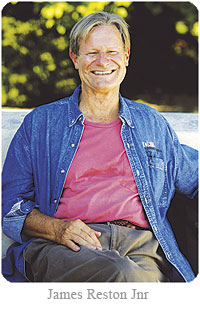 Reston remarks:
Reston remarks:
“I was in army intelligence … and the Mutt and Jeff, good cop-bad cop thing is usually two people, but Frost, he did both roles.”
The relish of James Reston Jr to tell the world “I made the bullets that Frost fired” is understandable. As articled clerks, solicitors and junior barristers, we have all enjoyed the pleasure of seeing the bullets that we made being fired by a more senior lawyer. It’s a pleasure, but a vicarious one. The parts in the book in which Reston agonises about Frost’s lack of preparation for the Watergate interview reminded me of past anxieties as junior counsel to some QCs who never appeared to read the brief in the weeks and days leading up to a trial, and who were still on a steep learning curve when we conferred at “Don’t Walk” signs on the way to court. The anxiety was dispelled when we got into court, and they “did the business”. Contrary to earlier indications, they had gotten around to reading the brief, or the few bullets handed to them just before court were all they needed to win the case.
The Conviction of Richard Nixon is more than an insider’s account on how an historic feat of cross-examination was achieved by a team of researchers and an underestimated “entertainer”. It reminds us of bigger issues. One is the idea that the President is above the law. Nixon’s brazen statement “If the President did it, that means it’s not illegal” has a sad parallel with the Bush administration’s lawlessness, evidenced by the legal black hole it designed at Guantanamo Bay and the illegal bugging of its own citizens in the name of the war against terror.
Another issue is the role of the media in a modern democracy. Nixon may have been his own worst enemy but his downfall began with the investigative journalism of Bob Woodward and Carl Bernstein, backed by the editor and the publisher of The Washington Post. Nixon’s disgrace was completed in 1977 by Frost’s Watergate interview. Frost’s technique of lulling Nixon into a false sense of security before ambushing was something to behold. So too was Jana Wendt’s job on Alan Bond in January 1988, shortly after Bond had bought the television network that employed her. I had the opportunity to see the unedited interview during a hearing before the Australian Broadcasting Tribunal. Wendt put Bond at ease before suddenly opening up with a series of devastating questions about the $400,000 that Bond paid Premier Bjelke-Petersen, ostensibly, in settlement of a dormant defamation claim. Under Wendt’s unexpected questioning, Bond acknowledged that he had paid the money as the price for doing business in Queensland: something he had earlier denied in a witness box. In that answer, Bond “impeached himself”.
It was a great moment in journalism, and a great moment in entertainment. These days “current affairs” television has little to do with journalism and is part of the “entertainment industry”. Still, highly-skilled practitioners of their craft, like David Frost and Jana Wendt, prove that a well prepared and cleverly executed political interview can make both history and great television.
Peter Applegarth SC
Footnote
- Scribe Publications is an independent Australian book publishing company established by Henry Rosenbloom in 1976. It has won awards as Australian small publisher of the year in 2006 and 2008. It can be located at http://www.scribepublications.com.au/ .



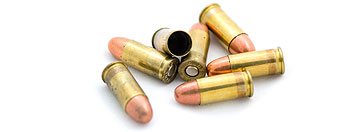

 Nixon is a psychoanalyst’s goldmine: an ambitious student from a poor Quaker upbringing. His family’s poverty meant he declined a scholarship to Harvard. He is a football fanatic who quotes his College football coach saying “Show me a good loser, and I’ll show you a loser”. He claims to follow the Quaker concept of “Peace at the Center”, meaning that he is able to retain peace within, while storms and adversity circle him. Yet he is moved by dark forces. Reston hints at something weird in Nixon’s relationship with some associates with whom he would hang out in Florida during his Presidency.
Nixon is a psychoanalyst’s goldmine: an ambitious student from a poor Quaker upbringing. His family’s poverty meant he declined a scholarship to Harvard. He is a football fanatic who quotes his College football coach saying “Show me a good loser, and I’ll show you a loser”. He claims to follow the Quaker concept of “Peace at the Center”, meaning that he is able to retain peace within, while storms and adversity circle him. Yet he is moved by dark forces. Reston hints at something weird in Nixon’s relationship with some associates with whom he would hang out in Florida during his Presidency. Frost assumes ascendancy when he shows that he is familiar with the elements of the offence of endeavouring to pervert the course of justice. Nixon is not. Frost is on top of his brief. Initially, he cannot extract a confession from Nixon of being part of a cover-up. But Nixon is on the ropes.
Frost assumes ascendancy when he shows that he is familiar with the elements of the offence of endeavouring to pervert the course of justice. Nixon is not. Frost is on top of his brief. Initially, he cannot extract a confession from Nixon of being part of a cover-up. But Nixon is on the ropes. Thirty years later, a battle has opened between Reston and Frost over bragging rights for the Watergate interview. Reston’s book is a claim for the credit in providing Frost with the material. Reston’s research enabled Frost to quote to Nixon critical passages of Nixon’s own words from previously unreleased transcripts of White House recordings. Frost rattled them off to devastating effect. Nixon’s own gangster-like words from the transcript convict him. These were the bullets that Reston made, and Frost fired.
Thirty years later, a battle has opened between Reston and Frost over bragging rights for the Watergate interview. Reston’s book is a claim for the credit in providing Frost with the material. Reston’s research enabled Frost to quote to Nixon critical passages of Nixon’s own words from previously unreleased transcripts of White House recordings. Frost rattled them off to devastating effect. Nixon’s own gangster-like words from the transcript convict him. These were the bullets that Reston made, and Frost fired. Reston remarks:
Reston remarks: